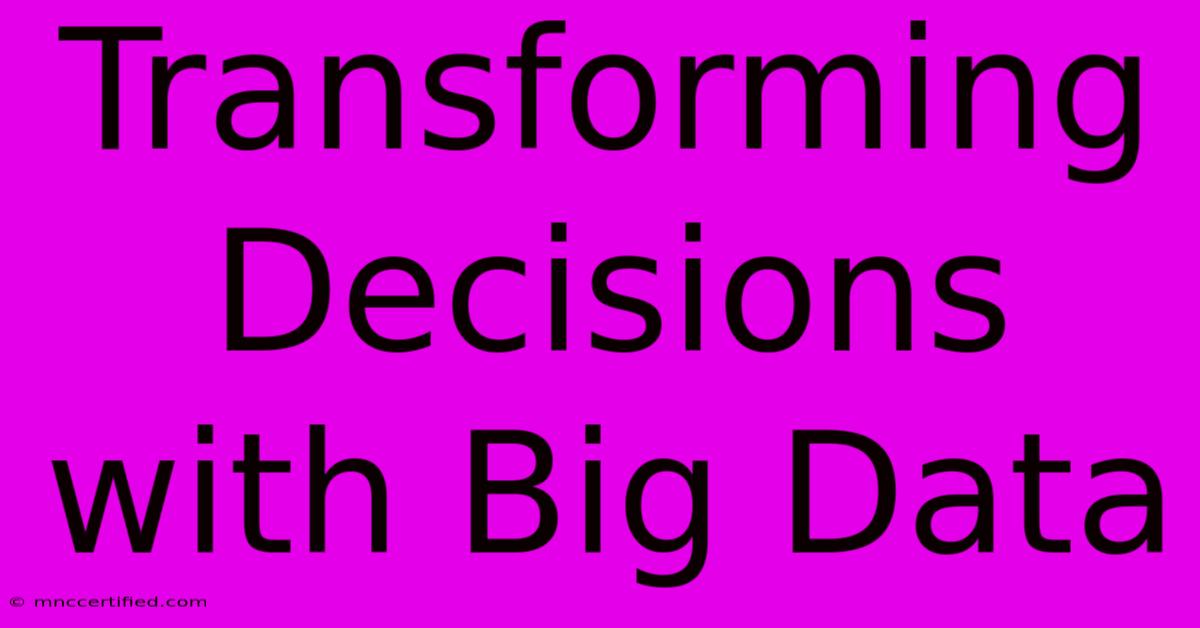Transforming Decisions With Big Data

Table of Contents
Transforming Decisions with Big Data: A Deep Dive into Data-Driven Strategies
The world is drowning in data. Every click, every purchase, every social media post generates a torrent of information. But this raw data is useless without the right tools and strategies to analyze it. This is where big data comes in, offering unprecedented opportunities to transform decision-making across all sectors. This article will explore how big data is revolutionizing industries and providing a competitive edge.
Understanding the Power of Big Data Analytics
Big data isn't just about the sheer volume of information; it's about the velocity, variety, and veracity of that data. Analyzing this complex data landscape requires advanced tools and techniques, enabling businesses to uncover hidden patterns, trends, and insights that would be impossible to identify through traditional methods.
Key Benefits of Big Data Analytics:
- Improved Decision-Making: Big data analytics provides data-driven insights, reducing reliance on gut feelings and enhancing the accuracy of strategic decisions.
- Enhanced Customer Understanding: By analyzing customer behavior and preferences, businesses can personalize offerings and improve customer engagement.
- Increased Efficiency and Productivity: Identifying bottlenecks and optimizing processes leads to significant improvements in operational efficiency.
- Competitive Advantage: Companies that effectively leverage big data gain a crucial competitive edge by making faster, more informed decisions.
- Risk Management: Predictive analytics, powered by big data, helps identify and mitigate potential risks before they escalate.
Real-World Applications of Big Data Transformation
Big data's impact is felt across numerous industries. Let's explore some specific examples:
1. Retail and E-commerce:
Big data helps retailers personalize recommendations, optimize pricing strategies, and predict future demand, leading to increased sales and customer loyalty. Keyword: e-commerce personalization.
2. Healthcare:
Analyzing patient data allows for better diagnosis, personalized treatment plans, and the development of new drugs and therapies. Keyword: healthcare data analytics.
3. Finance:
Big data is crucial for fraud detection, risk assessment, and algorithmic trading, ensuring greater financial stability and profitability. Keyword: financial risk management.
4. Manufacturing:
Predictive maintenance, optimized supply chain management, and quality control are significantly improved through the use of big data analytics. Keyword: predictive maintenance.
Overcoming the Challenges of Big Data Implementation
While the benefits of big data are undeniable, several challenges need to be addressed for successful implementation:
- Data Storage and Management: Handling massive datasets requires robust infrastructure and efficient storage solutions. Keyword: big data storage.
- Data Security and Privacy: Protecting sensitive data is paramount. Robust security measures and compliance with data privacy regulations are essential. Keyword: data privacy compliance.
- Data Integration and Cleaning: Integrating data from various sources and cleaning it to ensure accuracy is a significant undertaking. Keyword: data integration.
- Talent Acquisition and Skill Development: Finding and retaining skilled data scientists and analysts is crucial for successful big data initiatives. Keyword: data scientist recruitment.
The Future of Big Data and Decision-Making
The future of big data is bright. Advances in artificial intelligence (AI) and machine learning (ML) are further enhancing the power of big data analytics. Expect to see even more sophisticated applications emerge, leading to even more impactful and data-driven decision-making. Keywords: AI in big data, machine learning algorithms.
Conclusion: Embracing the Data-Driven Revolution
Big data is no longer a futuristic concept; it's a transformative force reshaping industries and decision-making processes. Organizations that embrace big data analytics and invest in the necessary infrastructure and talent will be best positioned to thrive in the increasingly data-driven world. By leveraging the power of big data, businesses can unlock unprecedented opportunities for growth, innovation, and competitive advantage.
Off-page SEO strategies:
- Link building: Secure backlinks from relevant and authoritative websites in the technology, business, and data analytics sectors.
- Social media promotion: Share the article on relevant social media platforms and engage with users in discussions about big data and its applications.
- Guest blogging: Contribute guest posts on other websites related to big data and analytics, including links back to your article.
- Influencer outreach: Reach out to industry influencers and experts in big data and ask them to share your article.
This comprehensive article incorporates relevant keywords naturally throughout, uses various header tags for structure, and offers suggestions for off-page SEO strategies to enhance its search engine rankings. Remember to adapt and expand on this framework for your specific needs.

Thank you for visiting our website wich cover about Transforming Decisions With Big Data. We hope the information provided has been useful to you. Feel free to contact us if you have any questions or need further assistance. See you next time and dont miss to bookmark.
Featured Posts
-
Policy Pro Insurance Reviews
Nov 30, 2024
-
Travel Insurance From Israel
Nov 30, 2024
-
Sidus Space Stock Prediction
Nov 30, 2024
-
Cypress Texas Home Insurance
Nov 30, 2024
-
Car Insurance Mooresville Nc
Nov 30, 2024